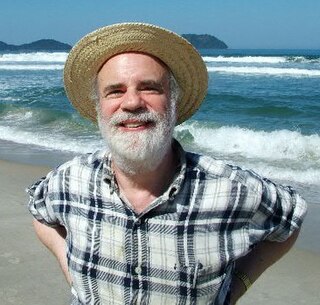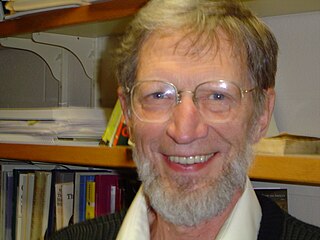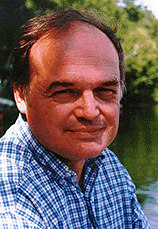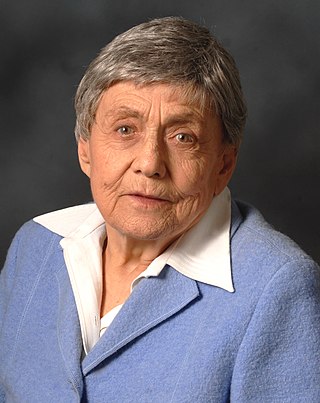Related Research Articles

Willard Van Orman Quine was an American philosopher and logician in the analytic tradition, recognized as "one of the most influential philosophers of the twentieth century". He served as the Edgar Pierce Chair of Philosophy at Harvard University from 1956 to 1978.

Saul Aaron Kripke was an American analytic philosopher and logician. He was Distinguished Professor of Philosophy at the Graduate Center of the City University of New York and emeritus professor at Princeton University. From the 1960s until his death, he was a central figure in a number of fields related to mathematical and modal logic, philosophy of language and mathematics, metaphysics, epistemology, and recursion theory.
In philosophy, rationalism is the epistemological view that "regards reason as the chief source and test of knowledge" or “the position that reason has precedence over other ways of acquiring knowledge”, often in contrast to other possible sources of knowledge such as faith, tradition, or sensory experience. More formally, rationalism is defined as a methodology or a theory "in which the criterion of truth is not sensory but intellectual and deductive".

Alvin Carl Plantinga is an American analytic philosopher who works primarily in the fields of philosophy of religion, epistemology, and logic.
Understood in a narrow sense, philosophical logic is the area of logic that studies the application of logical methods to philosophical problems, often in the form of extended logical systems like modal logic. Some theorists conceive philosophical logic in a wider sense as the study of the scope and nature of logic in general. In this sense, philosophical logic can be seen as identical to the philosophy of logic, which includes additional topics like how to define logic or a discussion of the fundamental concepts of logic. The current article treats philosophical logic in the narrow sense, in which it forms one field of inquiry within the philosophy of logic.

Arthur Norman Prior, usually cited as A. N. Prior, was a New Zealand–born logician and philosopher. Prior (1957) founded tense logic, now also known as temporal logic, and made important contributions to intensional logic, particularly in Prior (1971).

Ian MacDougall Hacking was a Canadian philosopher specializing in the philosophy of science. Throughout his career, he won numerous awards, such as the Killam Prize for the Humanities and the Balzan Prize, and was a member of many prestigious groups, including the Order of Canada, the Royal Society of Canada and the British Academy.

George Stephen Boolos was an American philosopher and a mathematical logician who taught at the Massachusetts Institute of Technology.

Ruth Barcan Marcus was an American academic philosopher and logician best known for her work in modal and philosophical logic. She developed the first formal systems of quantified modal logic and in so doing introduced the schema or principle known as the Barcan formula. Marcus, who originally published as Ruth C. Barcan, was, as Don Garrett notes "one of the twentieth century's most important and influential philosopher-logicians". Timothy Williamson, in a 2008 celebration of Marcus' long career, states that many of her "main ideas are not just original, and clever, and beautiful, and fascinating, and influential, and way ahead of their time, but actually – I believe – true".
Logical possibility refers to a logical proposition that cannot be disproved, using the axioms and rules of a given system of logic. The logical possibility of a proposition will depend upon the system of logic being considered, rather than on the violation of any single rule. Some systems of logic restrict inferences from inconsistent propositions or even allow for true contradictions. Other logical systems have more than two truth-values instead of a binary of such values. Some assume the system in question is classical propositional logic. Similarly, the criterion for logical possibility is often based on whether or not a proposition is contradictory and as such, is often thought of as the broadest type of possibility.

David Kellogg Lewis was an American philosopher. Lewis taught briefly at UCLA and then at Princeton University from 1970 until his death. He is closely associated with Australia, whose philosophical community he visited almost annually for more than 30 years.
Clarence Irving Lewis was an American academic philosopher. He is considered the progenitor of modern modal logic and the founder of conceptual pragmatism. First a noted logician, he later branched into epistemology, and during the last 20 years of his life, he wrote much on ethics. The New York Times memorialized him as "a leading authority on symbolic logic and on the philosophic concepts of knowledge and value." He was the first to coin the term "Qualia" as it is used today in philosophy, linguistics, and cognitive sciences.

Nicholas Rescher was a German-born American philosopher, polymath, and author, who was a professor of philosophy at the University of Pittsburgh from 1961. He was chairman of the Center for Philosophy of Science and chairman of the philosophy department.
A possible world is a complete and consistent way the world is or could have been. Possible worlds are widely used as a formal device in logic, philosophy, and linguistics in order to provide a semantics for intensional and modal logic. Their metaphysical status has been a subject of controversy in philosophy, with modal realists such as David Lewis arguing that they are literally existing alternate realities, and others such as Robert Stalnaker arguing that they are not.
Early Islamic law placed importance on formulating standards of argument, which gave rise to a "novel approach to logic" in Kalam . However, with the rise of the Mu'tazili philosophers, who highly valued Aristotle's Organon, this approach was displaced by the older ideas from Hellenistic philosophy. The works of al-Farabi, Avicenna, al-Ghazali and other Muslim logicians who often criticized and corrected Aristotelian logic and introduced their own forms of logic, also played a central role in the subsequent development of European logic during the Renaissance.
A fallacy of necessity is a fallacy in the logic of a syllogism whereby a degree of unwarranted necessity is placed in the conclusion.
Epistemic modal logic is a subfield of modal logic that is concerned with reasoning about knowledge. While epistemology has a long philosophical tradition dating back to Ancient Greece, epistemic logic is a much more recent development with applications in many fields, including philosophy, theoretical computer science, artificial intelligence, economics, and linguistics. While philosophers since Aristotle have discussed modal logic, and Medieval philosophers such as Avicenna, Ockham, and Duns Scotus developed many of their observations, it was C. I. Lewis who created the first symbolic and systematic approach to the topic, in 1912. It continued to mature as a field, reaching its modern form in 1963 with the work of Saul Kripke.
Dagfinn Føllesdal is a Norwegian-American philosopher. He is the Clarence Irving Lewis Professor of Philosophy Emeritus at Stanford University, and professor emeritus at the University of Oslo.
Thomas McKay is an American philosopher currently professor of philosophy and director of graduate studies at the department of philosophy of Syracuse University. He was chairman of the department there from 1995 to 2002. He received his B.A. from Swarthmore College in 1969, his M.A. from University of Massachusetts Amherst in 1972, and his Ph.D., also from the University of Massachusetts, 1974, for a dissertation on "Essentialism and Quantified Modal Logic: Quine's Argument and Kripke's Semantics"
In the philosophy of religion, an ontological argument is a deductive philosophical argument, made from an ontological basis, that is advanced in support of the existence of God. Such arguments tend to refer to the state of being or existing. More specifically, ontological arguments are commonly conceived a priori in regard to the organization of the universe, whereby, if such organizational structure is true, God must exist.
References
- ↑ "Modal Logic". The Stanford Encyclopedia of Philosophy . Metaphysics Research Lab, Stanford University. 2021.
- ↑ Humberstone, Lloyd (2016). "Reviewed Work: Modal Logic for Philosophers. Second Edition James W. Garson". Studia Logica. 104 (2). Springer: 365–379. ISSN 0039-3215. JSTOR 24754808 . Retrieved 2025-01-11.
- ↑ "Modal logic philosophers 2nd edition | Logic | Cambridge University Press".
- ↑ "Vita". Archived from the original on 2010-08-07. Retrieved 2011-01-28.